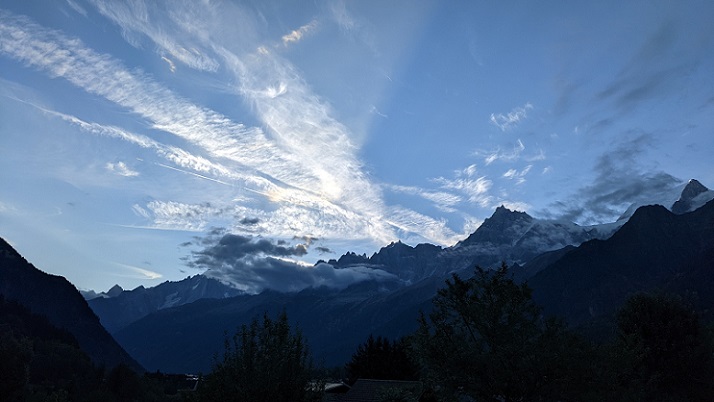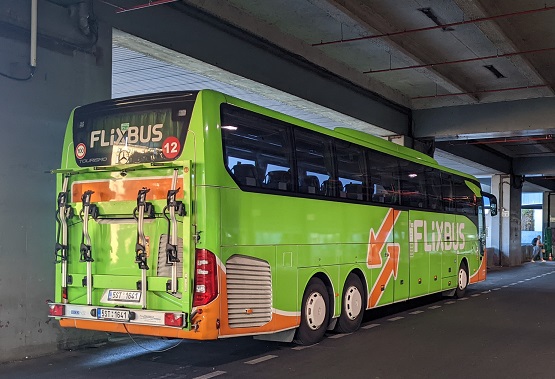
I am back from six weeks in Europe, the first four walking and running the Pyrenees from the Atlantic to the Mediterranean by the Haute Raute (HRP), followed by a section of the GR5 from Les Houches below Chamonix to Modane. I had half-intended to keep parkswatch going with some posts while away but my journey was all-absorbing and problems with vodafone meant I had no access to the internet for extended periods.
Not knowing the weather forecast some days was a surprisingly liberating experience which made me realise how much our experience of the outdoors, even the wildest places, is normally mediated by what others, and increasingly this means the tech giants, tell us. The use of mobile phones for navigation was almost ubiquitous on the HRP and GR5 and has reduced the chances that those whose use them will get lost or take the “wrong” route – as I did several times – to close to zero unless the device fails. I followed someone for a couple of hours whose phone told him if he stepped even a few metres “off route” and who was carrying several battery packs to mitigate against device failure. Instead of self-reliance, deciding your own route and finding your own way, google dependency.
With that comes not just a loss of adventure but other dangers. It surely won’t be that long until the Cairngorms National Park Authority (CNPA) tries to find a way to use the technology to “encourage” more people to “keep to the path”, the message it is promoting (see here for example) contrary to Scotland’s access rights
While absorbed at first by the natural beauty of the mountains and the physical challenge, the unfolding evidence of global environmental catastrophe increasingly occupied my thoughts. I started out during the “canicule”, a French word that is far more expressive than “heatwave”. Like most I temporarily struggled with temperatures of over 36C at 1400m but after getting over that what then struck me was the ecological impacts of the heat, weeks after the temperatures had dropped. And how those ecological impacts are being made far worse because of the way much of the land in the European mountains is being mismanaged and often trashed.
I saw little evidence that Europe, including its National Parks, is responding to the environmental catastrophe any better than Scotland though they do plenty of other things, including the management of outdoor recreation, better than we do. The failure to address carbon emissions and ongoing destruction of the natural environment, which together threaten a large proportion of humanity, is global.
Based on what I experienced I will consider the implications for Scotland’s National Park in a short series of posts, starting here with transport.
The transport challenge
Transport accounts for between a fifth and a quarter of carbon emissions worldwide and of this 60% is attributable to the movement of people, rather than goods. If everyone stopped travelling by plane or car, as a few people have chosen to do, that would go a long way towards reducing carbon emissions. While the aviation industry argues it accounts for a relatively small proportion of those carbon emissions (around 11%), looking up above Chamonix a couple of weeks ago I could see at any one time at least three aircraft and sometimes a lot more. And that is by an industry still not running at full capacity because of layoffs during Covid.
The photograph was taken the day the weeklong series of trail runs known as the UTMB (Ultra Trail of Mont Blanc) started. This involves something like 10,000 runners whose carbon emission in getting to and from Chamonix will dwarf the much publicised efforts of that town to reduce the carbon impacts of tourism (the local train has long been free to those staying in the valley and electric buses now circulate in the streets). We are fiddling while the world burns.
To reduce emissions we need to stop treating how we get around as a matter of individual choice and leaving it to a private market addicted to fossil fuels to come up with solutions. Paradoxically, while passenger transport emissions fell dramatically during the Covid crisis, during this period my own attempts to reduce carbon emissions were knocked completely off course as I used my car to escape to the countryside. But for the whole of my travel from Scotland and around Europe I went back to public transport. From that experience I believe there are three major impediments to everyone being able to do this.
The first is cost. £120 to get from Glasgow to London with a senior railcard, £40 back. £160 to get to Paris by Eurostar but again £40 back. The night train to Hendaye at the south west corner of France, £90, but £45 to get from Modane back to Paris on the TGV. A mishmash of good and bad value but a considerable sum in total. Almost all these journeys were booked just a few weeks beforehand and, had I been able to commit to particular dates for travel in advance, I could no doubt have “saved” a significant amount. But most people, most of the time, cannot do this. We need a rational charging system for train transport, where the charge is by the mile/kilometre and is cheaper than air travel.
The second is capacity. I did not know when I was going to finish the HRP so went to the station at Banyal sur Mers the day I finished only to be told that all trains and long distance buses were fully booked for the next two days! While you could end up in worse place this was rubbish, a consequence of perverse booking systems, as I could see empty seats on the trains. Having escaped to Perpignan by the one euro local bus, I managed to secure a bundle of different tickets to let me travel to Chamonix, but there are major public transport capacity issues even in Europe. If we want to save what is left of the natural environment we need far more trains and electric buses (electric cars are not the answer, there are not enough of the minerals required to make batteries in the world). The problem is not in itself mass tourism, as per the UTMB, but that the current capacity to enable people to travel and experience the natural world sustainably is totally inadequate.
The third is time. In almost seven weeks away, I have spent almost six days travelling. For someone in work with only a week’s holiday, getting to the Pyrenees or Alps from Scotland is almost impossible, so people fly or jump in a car and share the driving. We seem to have forgotten that when the channel tunnel was first mooted, the idea was that people should be able to travel directly to Europe by train. With an affordable sleeper service (we need sleepers on the French model, six bunks like in a mountain refuge, instead of the prohibitively expensive upgraded service now serving Scotland), it would be possible for people to leave the central belt late in the afternoon and get to places like Geneva the next morning……..and vice versa. That would help enable those who enjoy activities like downhill skiing to preserve what they love doing. But as the land burns and shrivels, that doesn’t appear on any political agenda and people end up contributing to the destruction of what they care about about most.
Scotland’s National Park Authorities could be playing a role in changing how we think about transport and plan for sustainable tourism instead of supporting the status quo as they do at present. Rather than the welcome at Glasgow airport (see here), which is used to promote air travel, it would be far more appropriate for the LLTNPA to be sponsoring signage at Glasgow Central. The LLTNPA could also respond to the young people resident in the National Park who prioritised the improvement of public transport before all else, while the Cairngorms National Park Authority could address the scandal that the eastern half of the Cairngorms National Park remains almost totally inaccessible to those without a car. Both National Parks could make the case for a fairer and affordable fares system: for example at present it costs £4.80 for an adult to make the 8 minute journey by City Link coach between Crianlarich and Tyndrum. They could also demand that all coaches and trains increased their capacity to carry bikes, something that is now fairly standard across the rest of Europe. And so on…………………………………………

And, as important as the infrastructure, they could be making the point that to enjoy and experience nature sustainably, requires people to have the time to travel.
Over the next few weeks parkswatch will be taking a closer look at what our National Parks are doing to promote sustainable travel. Welcome back!

“[Affordable sleepers] would help enable those who enjoy activities like downhill skiing to preserve what they love doing. But as the land burns and shrivels, that doesn’t appear on any political agenda and people end up contributing to the destruction of what they care about most.”
I love downhill skiing, but it’s a perfect example of an activity where “people end up contributing to the destruction of what they care about most”. All that energy-intensive uplift, unless renewably sourced, contributes to climate change, melting the alpine glaciers and ski-fields we love – not to mention the total madness of fossil-fuelled snow-making. And when I say “we”, I know it’s another example of the affluent few (whether people or nations) messing the climate up for everyone else.
Until the systemic corrections you advocate – plus others to make downhill skiing sustainable (if that’s even possible) – are made, those with choices will continue to fly to the Alps for their downhill thrills, and I can’t really blame them if I’m going to carry on doing that – while those who don’t will suffer the worst consequences.